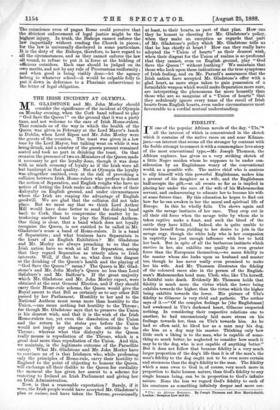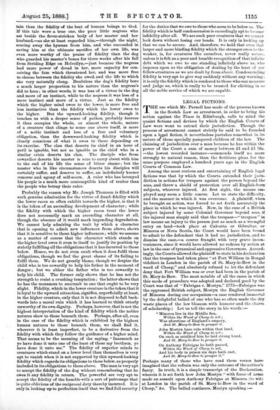FIDELITY.
IN one of the popular African novels of the day, "Ulu,"* all the interest of which is concentrated in the sketch which it contains of the native races on and near Kihnan- jaro,—an interest that seems all the stronger by contrast with the feeble attempt to connect it with a commonplace love-story of the most conventional type,—Ms. Joseph Thomson, the African explorer, has given us a very striking sketch of a little Negro maiden whom he supposes to be under con- sideration by an Englishman weary of the conventional world, as a possible wife. The native chief who is anxious to ally himself with this powerful Englishman, makes him a present of his daughter as a wife, and the Englishman half-accepts the gift,—at all events so far as is implied in placing her under the care of the wife of his Mahommedan servant, and endeavouring to educate her to become his wife at some future time. By this education he hopes to fmd- out how far he can awaken in her the moral and spiritual life of Europe. In this he wholly fails. Ulu shows again and again the savage instincts of her race. They crop out in all their old force when the savage tribe by whom she is taken captive make a feast, and suck the blood of the cattle they have killed. Indeed, she is quite unable to restrain herself from yielding to her desire to join in the savage orgy, though the white lady who is her companion in captivity has just enough influence with her to hold her back. But in spite of all the barbarous instincts which survive in her, she exhibits one quality in even greater force than the Europeans themselves,—we mean fidelity to the master whom she looks upon as husband and master too, though he has never really even promised to make her his wife. And Hr. Thomson illustrates the fidelity of the coloured races also in the person of the English- man's Mahommedan head man, lTledi, who, like Ulu herself, is faithful unto death. Evidently Mr. Thomson holds that fidelity is much more the virtue which the lower being exhibits towards the higher, than the virtue which the higher being exhibits towards the lower. His picture of fidelity to Gilmour is very vivid and pathetic. The author says of it :—" Of the complex feelings he [the Englishman] had awakened in ITin's darkened heart, Gilmour suspected nothing. In considering their respective relations one to another, he had unconsciously laid more stress on his feelings towards her, than on 131u's towards him. As he had so often said, he liked her as a man may his dog, she him as a dog may his master. Thinking only how little such a liking is to the man, who is capable of some- thing so much better, he neglected to consider how much it may be to the dog, who is not capable of anything better." But it does not follow that because fidelity is a very much larger proportion of the dog's life than it is of the man's, the man's fidelity to the dog ought not to be even more certain and strenuous than the dog's fidelity to the man. The fidelity which a man owes to God is, of course, very much more in proportion to finite human nature, than God's fidelity to any single human being, can be in proportion to God's infinite nature. None the less we regard God's fidelity to each of his creatures as something infinitely deeper and more cer- • flu: an African Romance. By Joseph Thomson and Miss Harris-Smith. London: [Sampson Low and Co. tain than the fidelity of the best of human beings to God. If this tale were a true one, the poor little negress who sat beside the fever-stricken body of her master and her husband,—as she at least regarded him,—through the night, scaring away the hyaenas from him, and who succeeded in saving him at the ultimate sacrifice of her own life, was even more worthy of the praise of fidelity than the dog who guarded his master's bones for three weeks after his fall from Striding Edge on Helvellyn,—just because the negress had more power of dread in her, more capacity for con- ceiving the fate which threatened her, and was more free to choose between the fidelity she owed, and the life to which she very naturally clung. Doubtless the dog's fidelity bore a much larger proportion to his nature than the negress's did to hers ; in other words, it was less of a virtue in the dog and more of an instinct, while to the negress it was less of a mere instinct and more of a virtue. Just so the fidelity which the higher mind owes to the lower, is more free and less instinctive than the fidelity which the lower owes to the higher. But the upward-looking fidelity, though it touches us with a deeper sense of pathos, probably because it thus occupies the whole, or almost the whole, nature of a creature that clings to some one above itself, is more of a noble instinct and less of a free and voluntary obligation, than the downward-looking fidelity which is clearly conscious of what it owes to those depending on its exercise. The clan that deserts its chief in an hour of peril is ignoble, but not so ignoble as the chief who in a similar crisis deserts his clan. The disciple who from cowardice deserts his master is sure to carry about with him to the end of his life the sense of bitter shame ; but the master who in like circumstances deserts his disciples will certainly suffer, and deserve to suffer, an indefinitely keener remorse and agony of self-scorn. A ruler who has betrayed his people is a much more contemptible kind of traitor than the people who betray their ruler.
Probably the reason why Mr. Joseph Thomson is filled with such genuine admiration for the virtue of dumb fidelity which the lower races so often exhibit towards the higher, is that it is the token of an ascending development of character; while the fidelity with which the higher races treat the lower does not necessarily mark an ascending character at all, though the absence of it would mark impending degradation. We cannot help admiring the trait by which a character that is opening to admit new influences from above, shows that it is sensitive to those higher influences ; while we assume as a matter of course that the character which stands on the higher level owes it even to itself to justify its position by strictly fulfilling all the obligations that it has incurred to those below. Hence, we do not even exult when it does fulfil those obligations, though we feel the great shame of its failing to fulfil them. We do not greatly blame, though we despise the child who is too cowardly to help his father in the moment of danger; but we abhor the father who is too cowardly to help his child. The former only shows that he has not the strength to resist a crashing temptation ; the latter shows that he has the meanness to succumb to one that ought to be very slight. Fidelity, which in the lower creature is the token that it is loyal to the upward attraction, signifies, superficially at least, in the higher creature, only that it is not disposed to fall back- wards into a moral ruin which it has learned to think utterly unworthy of its own dignity. Perhaps, however, that is not the highest interpretation of the kind of fidelity which the nobler natures show to those beneath them. Perhaps, after all, even in the case of the fidelity which is exhibited by the highest human natures to those beneath them, we shall find it, wherever it is least imperfect, to be a derivative from the fidelity with which they follow the guidance of a higher mind. That seems to be the meaning of the saying, "Inasmuch as ye have done it unto one of the least of these my brethren, ye have done it unto me." The fidelity of superior minds to creatures which stand on a lower level than themselves is very apt to vanish when it is not supported by this upward-looking fidelity which regards its obligations to those below, as properly included in its obligations to those above. The man is very apt to accept the fidelity of the dog without remembering that he owes it any fidelity in return. The powerful are very apt to accept the fidelity of the humble with a sort of patronage that is quite oblivious of the reciprocal duty thereby incurred. It is only in looking up to perfection itself that we find full security for the duties that we owe to those who seem to be below us. The fidelity which is half condescension is exceedingly apt to become infidelity after all. We are such poor creatures that we cannot look down without losing our heads. It is only in looking up that we can be secure. And, therefore, we hold that even that larger and more binding fidelity which the stronger owes to the weaker, is, for creatures like ourselves, never really secure, unless it is felt as a poor and humble recognition of that infinite debt which we owe to one standing infinitely above us, who imposes upon us the obligation of dealing by the least of our fellow-creaturea as we are dealt by from above. Condescending fidelity is very apt to give way suddenly without any warning; it is only the fidelity which is rendered to those who can measure and judge us, which is really to be trusted for eliciting in tta all the noble service of which we are capable.



































 Previous page
Previous page